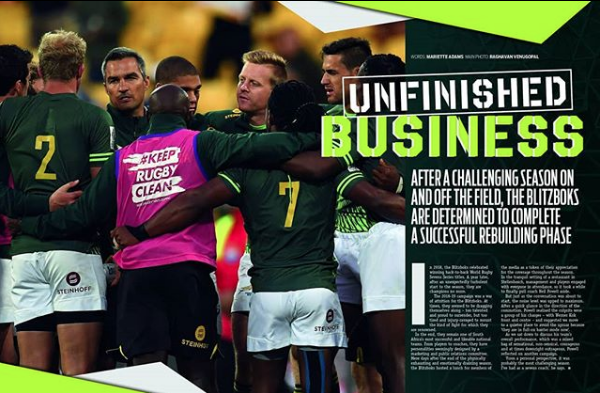After a challenging season on and off the field, the Blitzboks are determined to complete a successful rebuilding phase, writes MARIETTE ADAMS.
In 2018, the Blitzboks celebrated winning back-to-back World Rugby Sevens Series titles. A year later, after an unexpectedly turbulent start to the season, they are champions no more.
The 2018-19 campaign was a war of attrition for the Blitzboks. At times, they seemed to be dragging themselves along – too talented and proud to surrender, but too tired and injury-ravaged to mount the kind of fight for which they were renowned.
In the end, they remain one of South Africa’s most successful and likeable national teams. From players to coaches, they have personalities seemingly designed by a marketing and public relations committee. Mere days after the end of the physically exhausting and emotionally draining season, the Blitzboks hosted a lunch for members of the press as a token of their appreciation for the media coverage throughout the season.
In the tranquil setting of a restaurant in Stellenbosch, team management and players firmly engaged with everyone in attendance, so it took a while to finally pull coach Neil Powell aside.
But just as the conversation was about to start, the noise level was upped to maximum. After a quick glimpse in the direction of the commotion, Powell realised the culprits were a group of his charges – with Werner Kok front and centre – and suggested we move to a quieter place to avoid the uproar because ‘they are in full-on banter mode now’.
As we sat down to discuss his team’s overall performance, which was a mixed bag of sensational, non-sensical, courageous and at times downright outrageous, Powell repressed his frivolous state to reflect seriously on another campaign.
‘From a personal perspective, it was probably the most challenging season I’ve had as a sevens coach,’ he says.
‘I’ve experienced many ups and downs before, but our performances at the first few events of a new campaign have always been right up there as some of the best. This past season, we got off to a slow start. There were also one or two issues in our on-field performance – like team selection and the culture – that we needed to sort out.
‘There were times when I had to sit down with players individually, be honest with them and tell them they were doing things I did not like or approve of; things that are not part of our system and culture.’
It’s a startling admission, one that would suggest a shift in the way the team sees itself – as a unit whose culture isn’t as strong as it is made out to be.
But then Powell soon shreds that theory.
‘I had sat down more than a few of them, especially after the Hamilton and Sydney Sevens and it was the tipping point in our season. It could have gone either way, but the guys responded fairly well to what was said to them in those meetings and it showed in the latter stages of the series, when we managed to win a couple of tournaments,’ he says.
In spite of their early-season implosions, they still had a mathematical chance of defending their title and claiming a rare three-peat. But realistically – considering the multiple injuries within the squad, a player exodus and the lack of continuity in selection and consistency in performance – the remainder of the campaign was just a prolonged buildup to the Blitzboks relinquishing their status as world champions.
But this season there was much more on the line than the series title. Powell had on previous occasions stated their goal to secure automatic qualification for the 2020 Olympic Games in Tokyo. With only the top four teams on the series log advancing as the automatic entrants, and Fiji, USA and New Zealand sitting comfortably in the top three, this vastly handicapped and inexperienced Blitzboks side was embroiled in a fight for fourth with England, Australia and France.
The South Africans held their nerve to take that spot and Powell believes the accomplishment is testimony to the character of the players and their belief in each other, which bodes well for their Olympic challenge in July next year.
‘Consistency is a big part of success and if you need to change your squad before every leg of the series due to injuries and new players you want to test, it’s always going to be a difficult challenge. I think our tournament results are a fair reflection of that,’ he says.
‘I’m happy with the boys’ effort and how they pushed towards the end to ensure we reached our objective of Olympic qualification. I can tell you now, I did not fancy having to go to Johannesburg in November to play in a once-off qualifying tournament, where anything can happen.
‘Everyone involved felt a lot of different emotions, particularly the senior squad members who know the highs of winning a series title. But in retrospect there are no regrets at all about how this series ended. We are in a building phase and I couldn’t be more satisfied with how much exposure and experience the young players in the system gained.’
Of course rumours abound of a new wave of players – the Lions’ Hacjivah Dayimani for one – switching to the sevens set-up and the return of Seabelo Senatla. Powell, however, treads carefully when addressing the possibility of gaining more star power.
‘If those guys want to come back, they’re more than welcome. But I have to be honest, they are not just going to walk into 12-man playing team. We have so many young players who put up their hand, when the team needed them most, that it’ll be difficult to take them out for someone who comes from fifteens. And we still have more youngsters waiting to get an opportunity; boys who have earned the right to be next in contention for selection.
‘It’s not going to be a case of Seabelo, or anyone else for that matter, just rocking up and getting a spot. We will give everyone a chance, but it’ll be up to the newcomers to work hard and outperform the squad members for a place in the team.’
This is another trademark of Powell’s evolution as head coach of this charismatic Blitzboks side. His job stretches further than strategic manoeuvering because he forms wide-ranging connections with each player and rewards those who pledge loyalty.
He has always been a father figure for these men, despite their distinctive mix of personalities, and because of that, the Blitzboks usually respond to the command of their leader.
Regardless of their results, Powell always sets the right tone and realigns the collective focus. That is no small feat given how much time coaches and players spend together over a long, arduous season.
Admittedly, his approach is not a surefire barometer for success, which is relative and cyclic, but considering the current state of most other national teams – the Proteas imploding at the World Cup, Bafana’s sorry performances at Afcon and the Boks’ ongoing attempt to restore some pride in their ranks – it’s refreshing to see a team that is not in crisis mode even when they are not performing at their peak of their powers.
There are two single images that define the Blitzboks. In April, a video showed the team huddled around rookie Angelo Davids as a sort of welcoming initiation before his first cap. In June, the team gathered for the announcement of former captain Kyle Brown’s retirement. Two moments celebrating the two players at opposite ends of their careers. The actions and reactions of Powell and the rest of the squad reaffirmed the notion that all are equal within this setup, and it also confirmed that succession planning and player development and depth, are at an all-time high in the Blitzboks.
And it will only get better in the lead-up to the Olympic Games.
*This article first appeared in the August issue of SA Rugby magazine





